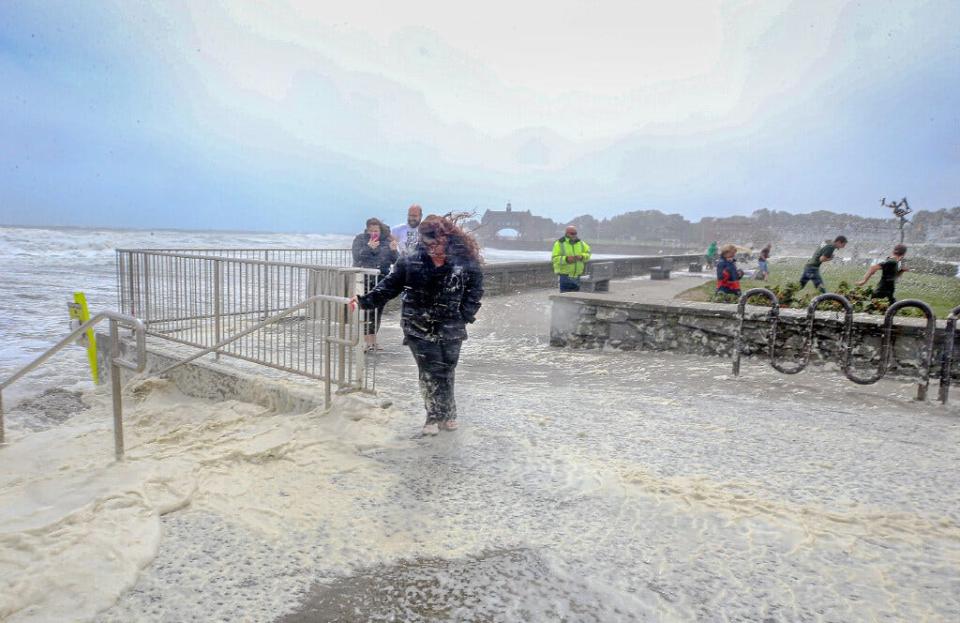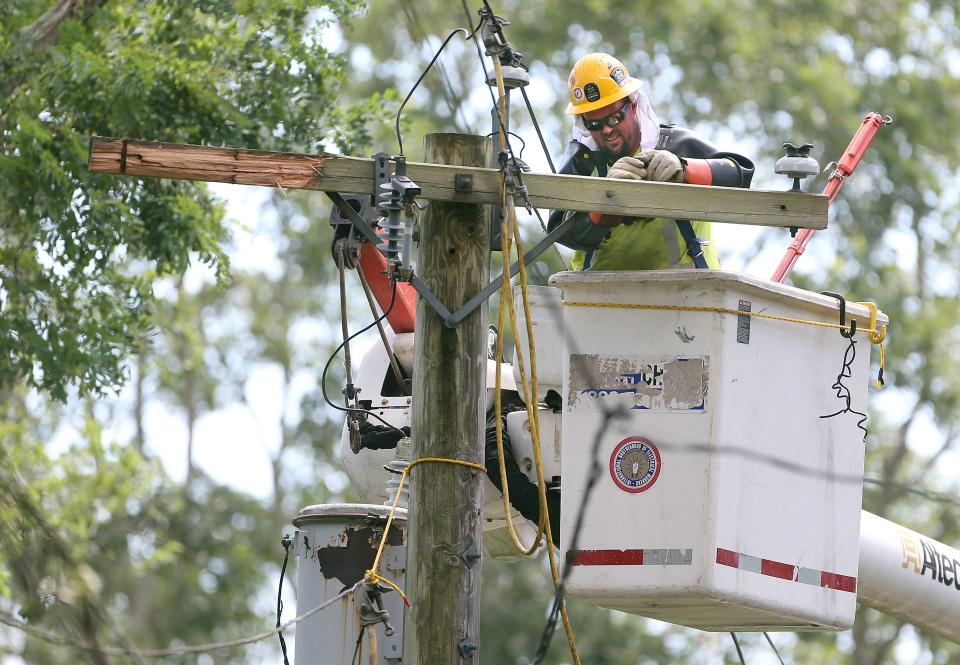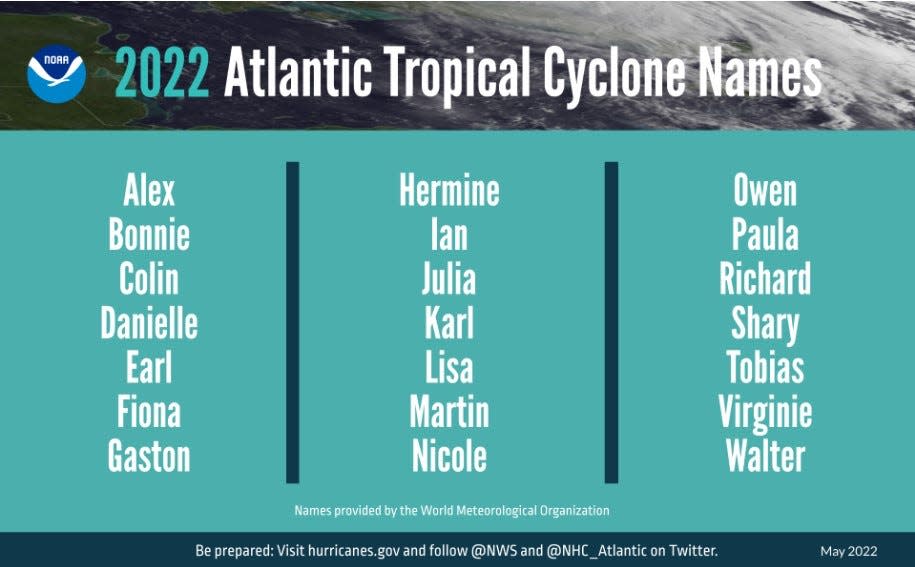NOAA: 10 hurricanes possible in the Atlantic this season
With her forecasters predicting as many as 10 hurricanes in the Atlantic this season, U.S. Commerce Secretary and former Rhode Island Gov. GinaM. Raimondo is urging people who live in potential storm paths to get ready now.
“Early preparation and understanding your risk is key to being hurricane-resilient and climate-ready,” said Raimondo, who left Rhode Island last year to join the Biden administration.
Hurricane season began Wednesday and there's a 65% chance of more hurricanes than normal in the Atlantic Ocean, according to forecasters at the National Ocean and Atmospheric Administration's Climate Prediction Center, part of the Commerce Department.

NOAA is forecasting 14 to 21 named storms (winds of 39 mph or higher), and says 6 to 10 of those could become hurricanes (sustained winds of 74 mph or higher). Of those hurricanes, 3 to 6 could become major hurricanes, category 3, 4 or 5, with winds of 111 mph or higher, NOAA says.
Here's how to prepare: Rhode Islanders told to prepare for hurricane season
Other forecasters have similar outlooks.
Researchers at Colorado State University are predicting 19 named storms with 9 of those becoming hurricanes and 4 reaching major hurricane strength, sustained winds of 111 miles per hour or greater.
AccuWeather, too, is forecasting more hurricanes than normal, with 16 to 20 named storms and 6 to 8 hurricanes, with 3 to 5 of those developing into major hurricanes.
If the forecasts hold up, this would be the seventh hurricane season in a row with more storms than normal, forecasters say. A normal season has 14 named storms, 7 hurricanes and 3 major hurricanes.
The last two Atlantic hurricane seasons were "extraordinarily active," according to AccuWeather, with the 2020 season setting a record for the number of named storms with 30. Last year was the third-most active on record with 21 named storms, AccuWeather said.
Track the storm: Here's how you can track active storms in the Atlantic

Rhode Islanders felt that wrath last summer when Henri approached the Ocean State as a hurricane before weakening to a tropical storm when it hit the coast Aug. 22. The storm nevertheless slammed the southern half of the state with heavy rain and powerful winds, knocking out power to about 75,000 electric customers.
Forecasters cite several climate factors in supporting their predictions, including warm sea temperatures in the Atlantic Ocean and Caribbean Sea, which can feed the storms.
They also point to surface water temperatures at the equatorial Pacific Ocean, which can shift the jet stream and affect weather conditions around the world, including whether hurricanes can form in the Atlantic.
With the water temperature cooler than normal at the equatorial Pacific, so-called La Niña is in place, which generally leads to a more active hurricane season, according to forecasters.
La Niña's complementary condition, El Niño, warmer waters, tends to increase upper-level westerly winds across the Caribbean into the tropical Atlantic, "tearing apart hurricanes as they try to form," according to forecasters at Colorado State University.
AccuWeather notes that La Niña was in place during the last two seasons.
Like Raimondo, the American Red Cross's Rhode Island Chapter is telling residents not to wait for the storm to arrive before doing anything.

“After back-to-back years of active hurricane seasons that have broken records, this year it’s more important than ever before to get ready now,” Susan Roberts, the chapter's executive director, said. “We’re encouraging everyone to take the steps today to prepare for any possible dangerous storms this year in Rhode Island.”
Here are some tips from the Red Cross:
• Create an evacuation plan. Plan what to do in case you are separated from your family during an emergency or if you need to evacuate. Plan multiple routes to local shelters.
• Build an emergency kit with a gallon of water per person, per day, non-perishable food, a flashlight, battery-powered radio, first aid kit, medications, supplies for infants or pets, a multi-purpose tool, personal hygiene items, copies of important papers, cell phone chargers, extra cash, blankets, maps of the area and emergency contact information.
• Stay informed. Find out how local officials will contact you during a disaster and how you will get important information, such as evacuation orders.
• Download the free Red Cross Emergency app. The app provides real-time weather alerts and tips on how to stay safe during severe weather and other emergencies. Search “American Red Cross” in app stores or go to redcross.org/apps.
Raimondo said, "Throughout the hurricane season, NOAA experts will work around-the-clock to provide early and accurate forecasts and warnings that communities in the path of storms can depend on to stay informed.”
Hurricane season ends Nov. 30.
jperry@providencejournal.com
(401) 277-7614
On Twitter: @jgregoryperry
Be the first to know.
Sign up for our breaking news alerts
This article originally appeared on The Providence Journal: 2022 Hurricane season expected to be a busy here's how to prepare

